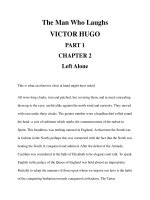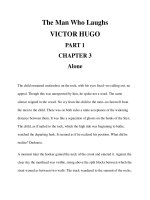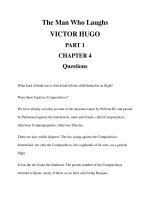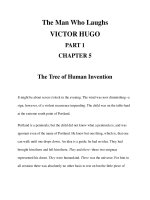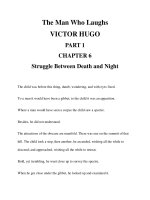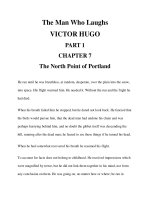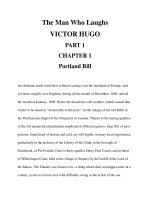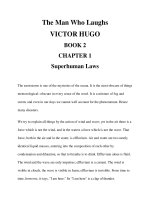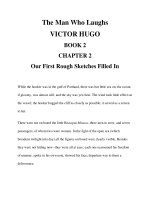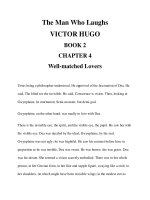The Man Who Laughs VICTOR HUGO BOOK 1-PART 1 CHAPTER 5 ppsx
Bạn đang xem bản rút gọn của tài liệu. Xem và tải ngay bản đầy đủ của tài liệu tại đây (21.59 KB, 8 trang )
The Man Who Laughs
VICTOR HUGO
PART 1
CHAPTER 5
The Tree of Human Invention
It might be about seven o'clock in the evening. The wind was now diminishing a
sign, however, of a violent recurrence impending. The child was on the table-land
at the extreme south point of Portland.
Portland is a peninsula; but the child did not know what a peninsula is, and was
ignorant even of the name of Portland. He knew but one thing, which is, that one
can walk until one drops down. An idea is a guide; he had no idea. They had
brought him there and left him there. They and there these two enigmas
represented his doom. They were humankind. There was the universe. For him in
all creation there was absolutely no other basis to rest on but the little piece of
ground where he placed his heel, ground hard and cold to his naked feet. In the
great twilight world, open on all sides, what was there for the child? Nothing.
He walked towards this Nothing. Around him was the vastness of human desertion.
He crossed the first plateau diagonally, then a second, then a third. At the extremity
of each plateau the child came upon a break in the ground. The slope was
sometimes steep, but always short; the high, bare plains of Portland resemble great
flagstones overlapping each other. The south side seems to enter under the
protruding slab, the north side rises over the next one; these made ascents, which
the child stepped over nimbly. From time to time he stopped, and seemed to hold
counsel with himself. The night was becoming very dark. His radius of sight was
contracting. He now only saw a few steps before him.
All of a sudden he stopped, listened for an instant, and with an almost
imperceptible nod of satisfaction turned quickly and directed his steps towards an
eminence of moderate height, which he dimly perceived on his right, at the point of
the plain nearest the cliff. There was on the eminence a shape which in the mist
looked like a tree. The child had just heard a noise in this direction, which was the
noise neither of the wind nor of the sea, nor was it the cry of animals. He thought
that some one was there, and in a few strides he was at the foot of the hillock.
In truth, some one was there.
That which had been indistinct on the top of the eminence was now visible. It was
something like a great arm thrust straight out of the ground; at the upper extremity
of the arm a sort of forefinger, supported from beneath, by the thumb, pointed out
horizontally; the arm, the thumb, and the forefinger drew a square against the sky.
At the point of juncture of this peculiar finger and this peculiar thumb there was a
line, from which hung something black and shapeless. The line moving in the wind
sounded like a chain. This was the noise the child had heard. Seen closely the line
was that which the noise indicated, a chain a single chain cable.
By that mysterious law of amalgamation which throughout nature causes
appearances to exaggerate realities, the place, the hour, the mist, the mournful sea,
the cloudy turmoils on the distant horizon, added to the effect of this figure, and
made it seem enormous.
The mass linked to the chain presented the appearance of a scabbard. It was
swaddled like a child and long like a man. There was a round thing at its summit,
about which the end of the chain was rolled. The scabbard was riven asunder at the
lower end, and shreds of flesh hung out between the rents.
A feeble breeze stirred the chain, and that which hung to it swayed gently. The
passive mass obeyed the vague motions of space. It was an object to inspire
indescribable dread. Horror, which disproportions everything, blurred its
dimensions while retaining its shape. It was a condensation of darkness, which had
a defined form. Night was above and within the spectre; it was a prey of ghastly
exaggeration. Twilight and moonrise, stars setting behind the cliff, floating things
in space, the clouds, winds from all quarters, had ended by penetrating into the
composition of this visible nothing. The species of log hanging in the wind partook
of the impersonality diffused far over sea and sky, and the darkness completed this
phase of the thing which had once been a man.
It was that which is no longer.
To be naught but a remainder! Such a thing is beyond the power of language to
express. To exist no more, yet to persist; to be in the abyss, yet out of it; to
reappear above death as if indissoluble there is a certain amount of impossibility
mixed with such reality. Thence comes the inexpressible. This being was it a
being? This black witness was a remainder, and an awful remainder a remainder
of what? Of nature first, and then of society. Naught, and yet total.
The lawless inclemency of the weather held it at its will; the deep oblivion of
solitude environed it; it was given up to unknown chances; it was without defence
against the darkness, which did with it what it willed. It was for ever the patient; it
submitted; the hurricane (that ghastly conflict of winds) was upon it.
The spectre was given over to pillage. It underwent the horrible outrage of rotting
in the open air; it was an outlaw of the tomb. There was no peace for it even in
annihilation: in the summer it fell away into dust, in the winter into mud. Death
should be veiled, the grave should have its reserve. Here was neither veil nor
reserve, but cynically avowed putrefaction. It is effrontery in death to display its
work; it offends all the calmness of shadow when it does its task outside its
laboratory, the grave.
This dead thing had been stripped. To strip one already stripped relentless act! His
marrow was no longer in his bones; his entrails were no longer in his body; his
voice no longer in his throat. A corpse is a pocket which death turns inside out and
empties. If he ever had a Me, where was the Me? There still, perchance, and this
was fearful to think of. Something wandering about something in chains can one
imagine a more mournful lineament in the darkness?
Realities exist here below which serve as issues to the unknown, which seem to
facilitate the egress of speculation, and at which hypothesis snatches. Conjecture
has its compelle intrare. In passing by certain places and before certain objects one
cannot help stopping a prey to dreams into the realms of which the mind enters. In
the invisible there are dark portals ajar. No one could have met this dead man
without meditating.
In the vastness of dispersion he was wearing silently away. He had had blood
which had been drunk, skin which had been eaten, flesh which had been stolen.
Nothing had passed him by without taking somewhat from him. December had
borrowed cold of him; midnight, horror; the iron, rust; the plague, miasma; the
flowers, perfume. His slow disintegration was a toll paid to all a toll of the corpse
to the storm, to the rain, to the dew, to the reptiles, to the birds. All the dark hands
of night had rifled the dead.
He was, indeed, an inexpressibly strange tenant, a tenant of the darkness. He was
on a plain and on a hill, and he was not. He was palpable, yet vanished. He was a
shadow accruing to the night. After the disappearance of day into the vast of silent
obscurity, he became in lugubrious accord with all around him. By his mere
presence he increased the gloom of the tempest and the calm of stars. The
unutterable which is in the desert was condensed in him. Waif of an unknown fate,
he commingled with all the wild secrets of the night. There was in his mystery a
vague reverberation of all enigmas.
About him life seemed sinking to its lowest depths. Certainty and confidence
appeared to diminish in his environs. The shiver of the brushwood and the grass, a
desolate melancholy, an anxiety in which a conscience seemed to lurk,
appropriated with tragic force the whole landscape to that black figure suspended
by the chain. The presence of a spectre in the horizon is an aggravation of solitude.
He was a Sign. Having unappeasable winds around him, he was implacable.
Perpetual shuddering made him terrible. Fearful to say, he seemed to be a centre in
space, with something immense leaning on him. Who can tell? Perhaps that equity,
half seen and set at defiance, which transcends human justice. There was in his
unburied continuance the vengeance of men and his own vengeance. He was a
testimony in the twilight and the waste. He was in himself a disquieting substance,
since we tremble before the substance which is the ruined habitation of the soul.
For dead matter to trouble us, it must once have been tenanted by spirit. He
denounced the law of earth to the law of Heaven. Placed there by man, he there
awaited God. Above him floated, blended with all the vague distortions of the
cloud and the wave, boundless dreams of shadow.
Who could tell what sinister mysteries lurked behind this phantom? The
illimitable, circumscribed by naught, nor tree, nor roof, nor passer-by, was around
the dead man. When the unchangeable broods over us when Heaven, the abyss,
the life, grave, and eternity appear patent then it is we feel that all is inaccessible,
all is forbidden, all is sealed. When infinity opens to us, terrible indeed is the
closing of the gate behind.
